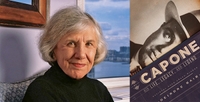JUNG: A Biography
Deirdre Bair, . . Little, Brown, $35 (881pp) ISBN 978-0-316-07665-4
Jung's shade would be content with Bair's biography, which in bulk and detail suggests that there is little more to say. Lucid and persuasive, the National Book Award–winning biographer of Beckett strikes a balance between damage control and deification, for Jung's ambition, arrogance and lack of generosity tend now to obscure his originality as a thinker and his impact on theories about why we dream and how we think. While Bair provides perhaps more about almost every aspect of his youth, maturity, rivalries, renown and old age than we care to know, it takes an author's note and two long endnotes to realize how much censorship the Jung heirs still insist upon. Bair was, for example, denied access to the diaries of Jung and his mother, which were deemed "too private," and to the thousand letters between Jung and his devoted (yet mistreated) wife. Even so, through interviews, published documentation and the papers released to her, Bair has evoked the man in all his cynical self-interest, opportunism, moral ambiguity, paradoxical insecurity and charismatic hold on decades of disciples. How much a purported Swiss temperament of suspicion, exclusiveness and obsession with ancestral status influenced Jung's development is a fascinating thread winding through Bair's narrative, affecting his personal and professional relations. Freud, father figure and then foe, comes off badly as ambitious, arrogant, single-minded and vengeful. Bair's Jung is no saint, but he is less unpleasant and exploitative here than as portrayed in Frank McLynn's 1997 biography. The large hole in this large book is not biographical. Jung's significance has much to do with his theories of archetypes and the related power of the collective unconscious. One finishes the book without much explanation of either. 32 pages of b&w photos.
Reviewed on: 09/15/2003
Genre: Nonfiction
Paperback - 928 pages - 978-0-316-15938-8


